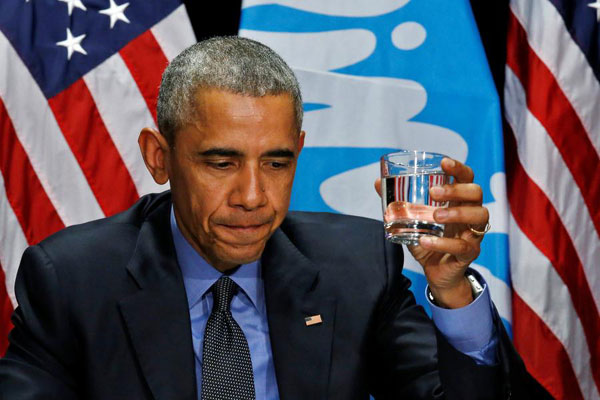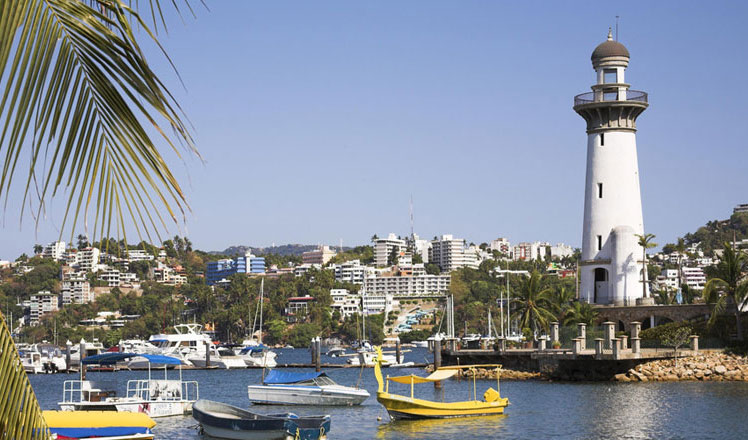Obama sips Flint water, urges children be tested for lead
Updated: 2016-05-05 09:36
(Agencies)
|
||||||||
 |
|
US President Barack Obama drinks a glass of filtered water from Flint, a city struggling with the effects of lead-poisoned drinking water, during a meeting will local and federal authorities in Michigan, May 4, 2016. [Photo/Agencies] |
FLINT, Mich. - President Barack Obama sipped filtered water in Flint, Michigan, on Wednesday and assured angry residents that their children would be fine in the long term despite the "complete screw-up" that contaminated their drinking water with lead.
Obama made the trip to the mostly African-American community to demonstrate that the water there was safe even as he predicted it would take more than two years to replace the city's aging pipes.
Flint, with a population of about 100,000, was under control of a state-appointed emergency manager in 2014 when it switched its water source from Detroit's municipal system to the Flint River to save money. The city switched back in October.
The river water was more corrosive than the Detroit system and caused more lead to leach from its aging pipes. Lead can be toxic, and children are especially vulnerable.
"This was a man made disaster. This was avoidable. This was preventable," Obama told a crowd at a local high school. "Flint's recovery is everybody's responsibility, and I'm going to make sure that responsibility is met."
The president urged parents to ensure their children were tested for lead and said residents should run their taps frequently to flush out remaining pollutants.
After coughing repeatedly during his remarks, he asked for a glass of water, and drank it in front of the crowd. Earlier he sipped from a glass of filtered Flint water during a meeting with regulators. The White House had said that it did not know if the president would drink filtered Flint water.Obama said the crisis had resulted from government officials at all levels not paying attention. Questions linger over whether environmental regulators could have acted more urgently to help the city, where more than 40 percent of its residents live in poverty.
- Rousseff: Accusations against her 'untruthful'
- Almost one-sixth of Brazil's confirmed microcephaly cases linked to Zika
- Impeachment trial against Rousseff recommended to senate
- With nomination secured, Trump to aim all guns at Hillary Clinton
- Obama sips Flint water, urges children be tested for lead
- Massive protests against Abe mark Japan's Constitution Memorial Day

 Five things you may not know about the Start of Summer
Five things you may not know about the Start of Summer
 Art imagines celebrities as seniors
Art imagines celebrities as seniors
 Japanese animator Miyazaki's shop a big hit in Shanghai
Japanese animator Miyazaki's shop a big hit in Shanghai
 Star Wars Day celebrated around world
Star Wars Day celebrated around world
 Lego man goes backpacking around world
Lego man goes backpacking around world
 Olympic flame lands in Brazil for 94-day relay to Games
Olympic flame lands in Brazil for 94-day relay to Games
 Top 10 least affordable cities to rent in
Top 10 least affordable cities to rent in
 Exhibition of Tibetan Thangka painting held in Lhasa
Exhibition of Tibetan Thangka painting held in Lhasa
Most Viewed
Editor's Picks

|

|

|

|

|

|
Today's Top News
Liang avoids jail in shooting death
China's finance minister addresses ratings downgrade
Duke alumni visit Chinese Embassy
Marriott unlikely to top Anbang offer for Starwood: Observers
Chinese biopharma debuts on Nasdaq
What ends Jeb Bush's White House hopes
Investigation for Nicolas's campaign
Will US-ASEAN meeting be good for region?
US Weekly

|

|







